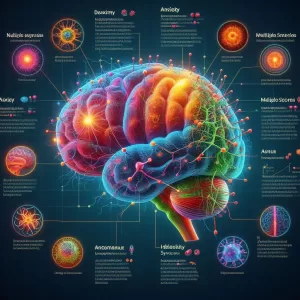Qu'est-ce que le trouble dysphorique prémenstruel (TDPM) ?
[wp_show_posts id=”8061″]
**What is Premenstrual Dysphoric Disorder (PMDD)?**
**Q: What is Premenstrual Dysphoric Disorder (PMDD)?**
**A:** Premenstrual Dysphoric Disorder (PMDD) is a severe form of premenstrual syndrome (PMS) that causes extreme mood swings and other symptoms in the week or two leading up to a woman’s period. These symptoms significantly interfere with daily life and can affect work, relationships, and social functioning.
**Q: What are the symptoms of PMDD?**
**A:** Common symptoms of PMDD include:
* **Emotional symptoms:** irritability, anxiety, depression, mood swings
* **Physical symptoms:** bloating, breast tenderness, fatigue, cravings
* **Cognitive symptoms:** difficulty concentrating, forgetfulness, confusion
* **Behavioral symptoms:** social isolation, difficulty sleeping, increased aggression
**Q: How is PMDD diagnosed?**
**A:** PMDD is diagnosed by a doctor, typically based on a patient’s symptoms and a menstrual diary that tracks mood changes and other symptoms over several cycles.
**Q: What causes PMDD?**
**A:** The exact cause of PMDD is unknown, but it is thought to be related to fluctuations in hormones, particularly estrogen and progesterone, during the menstrual cycle.
**Q: How is PMDD treated?**
**A:** There is no cure for PMDD, but treatments can help manage symptoms. Options include:
* **Medication:** antidepressants, hormonal therapy, birth control pills
* **Therapy:** cognitive-behavioral therapy, interpersonal therapy
* **Lifestyle changes:** exercise, diet, stress management
**Q: Is PMDD common?**
**A:** PMDD affects approximately 3-8% of women of reproductive age.
**Q: What is the difference between PMS and PMDD?**
**A:** PMS is a common condition that causes mild to moderate symptoms in the days leading up to a woman’s period. PMDD is a more severe form of PMS that causes extreme symptoms that significantly interfere with daily life.
**Q: Can PMDD affect fertility?**
**A:** PMDD can affect fertility in some women, as the hormonal imbalances associated with the disorder can interfere with ovulation.
**Q: Is PMDD a permanent condition?**
**A:** PMDD is a chronic condition that usually lasts throughout a woman’s reproductive years. Symptoms may improve after menopause.
**Q: Where can I find support for PMDD?**
**A:** There are several organizations that provide support and resources for women with PMDD, including:
* The International Association for Premenstrual Disorders (IAPMD)
* The PMDD Awareness Association
* The Center for Premenstrual Dysphoria and Treatment
**What is Premenstrual Dysphoric Disorder (PMDD)?**
**Q: What is Premenstrual Dysphoric Disorder (PMDD)?**
**A:** Premenstrual Dysphoric Disorder (PMDD) is a severe form of premenstrual syndrome (PMS) that causes extreme mood swings and other symptoms in the week or two leading up to a woman’s period. These symptoms significantly interfere with daily life and can affect work, relationships, and social functioning.
**Q: What are the symptoms of PMDD?**
**A:** Common symptoms of PMDD include:
* **Emotional symptoms:** irritability, anxiety, depression, mood swings
* **Physical symptoms:** bloating, breast tenderness, fatigue, cravings
* **Cognitive symptoms:** difficulty concentrating, forgetfulness, confusion
* **Behavioral symptoms:** social isolation, difficulty sleeping, increased aggression
**Q: How is PMDD diagnosed?**
**A:** PMDD is diagnosed by a doctor, typically based on a patient’s symptoms and a menstrual diary that tracks mood changes and other symptoms over several cycles.
**Q: What causes PMDD?**
**A:** The exact cause of PMDD is unknown, but it is thought to be related to fluctuations in hormones, particularly estrogen and progesterone, during the menstrual cycle.
**Q: How is PMDD treated?**
**A:** There is no cure for PMDD, but treatments can help manage symptoms. Options include:
* **Medication:** antidepressants, hormonal therapy, birth control pills
* **Therapy:** cognitive-behavioral therapy, interpersonal therapy
* **Lifestyle changes:** exercise, diet, stress management
**Q: Is PMDD common?**
**A:** PMDD affects approximately 3-8% of women of reproductive age.
**Q: What is the difference between PMS and PMDD?**
**A:** PMS is a common condition that causes mild to moderate symptoms in the days leading up to a woman’s period. PMDD is a more severe form of PMS that causes extreme symptoms that significantly interfere with daily life.
**Q: Can PMDD affect fertility?**
**A:** PMDD can affect fertility in some women, as the hormonal imbalances associated with the disorder can interfere with ovulation.
**Q: Is PMDD a permanent condition?**
**A:** PMDD is a chronic condition that usually lasts throughout a woman’s reproductive years. Symptoms may improve after menopause.
**Q: Where can I find support for PMDD?**
**A:** There are several organizations that provide support and resources for women with PMDD, including:
* The International Association for Premenstrual Disorders (IAPMD)
* The PMDD Awareness Association
* The Center for Premenstrual Dysphoria and Treatment
Un commentaire
Laisser un commentaire
Articles populaires








I am not a doctor and this is not medical advice. If you are suffering from significant mental health issues, please seek out a doctor. There are doctors who are trained to deal with this specific thing, and it requires specialised knowledge.